Livejournal
I have jumped ship. Read me at http://www.livejournal.com/users/drinkmojito/Ciao!
D.
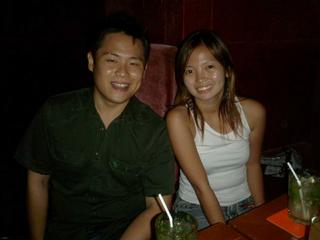 Nursing our alltimefavourite mojitos at New Asia Bar, Swissôtel Singapore.
Nursing our alltimefavourite mojitos at New Asia Bar, Swissôtel Singapore. 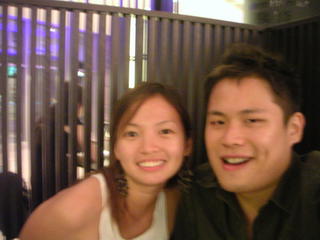 Huiling and I at Space @ Humble House
Huiling and I at Space @ Humble House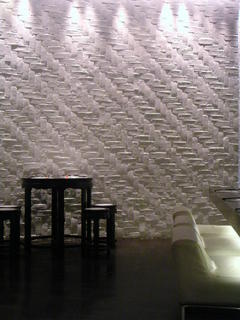 Stark space at Space @ Humble House
Stark space at Space @ Humble House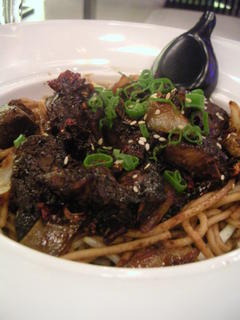 Gongbao Beef Noodles
Gongbao Beef Noodles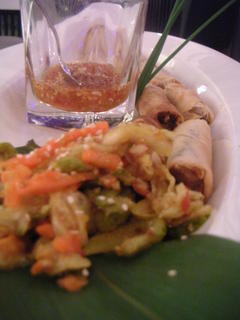 Duck Cigar Rolls
Duck Cigar RollsIt’s
I brought her to Space@HumbleHouse for dinner and also to 洗尘, an express version of My Humble House. You could think of it as Nobu Next Door if you like, fast, no frills, no reservations policy. Except that Humble House doesn’t have its tables full like Nobu does, which merits little need for a duh-worthy establishment like Space.
With so much conversation re. Shanghai in store, there was little room for the food we ordered: duck cigar rolls, crab nuggets, rice noodles slices of fish, and 宫保 gong bao beef noodles. All excellent—even the beef noodles turned out to be quite a surprise (lovely without being cloying—think an oversupply of 宫保鸡丁 after time spent in Beijing) , as we initially ordered it with much hesitation, worried that Huiling might have OD-ed on 宫保–this –that while subsisting on 外卖晚餐 during those nights when she chooses to stay in.
We went back to our (fairly) regular haunt, New Asia Bar, to have more mojitos and lychee bellinis before calling it a night. And even as I am writing this, I’ve finally got my act together to redeem my miles on SQ! I leave for
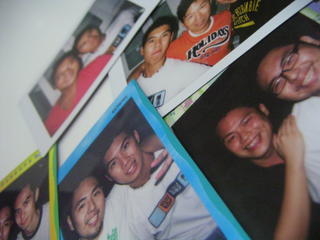 grande histoire: grand, plus grand, le plus grand
grande histoire: grand, plus grand, le plus grand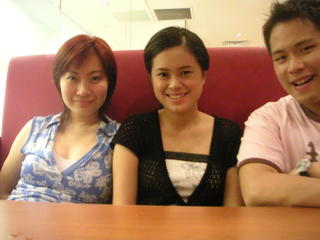 College pals: Yunsheng, Viv, D.
College pals: Yunsheng, Viv, D.With college pals, Vivien and Yunsheng, we did Macanese at Crystal Jade’s latest venture into Macanese 察餐厅 fare. For a country with a population with just 300, 000 digits (yes 300K, you read that right), they already have a discernible cuisine which can be readily exported to other parts of the world. Michelle Reis, if you can think of her as food of another kind, is in movies and the celeb circuit by way of
Goodwood Park Hotel on a rainy Tuesday. Kevin and I piled on the gossip mongering while indulging in old school high tea nyonya-style. High tea’s not my thing—I love variety and quantity but I have no room to pile on the inches, though I remember my first and last high tea experience very fondly. It was 1991, I was only 10, and I had laksa at the dull brasserie of the then-Hyatt Regency. Fastforward to 2005. Since it was Kevin’s belated birthday treat, I was more than happy to say yes, never mind the potential calories.
With little in the way of resistance, I soon piled on the laksa, chicken curry, kueh pie tee, bread dumplings and wings. It’s amazing how in
At Hour Glass’ party/Jubilee Hall on Friday, Jeffrey and I found overselves more occupied with conversations, Peking duck rolls, cocoa spare ribs and the bubbly rather than the event per se. Carl F. Bucherer awards, so named after the Swiss timepiece, was made all the more theatrical and fictitious with a host like Beatrice Chia. The winners went to the folks who took the path less treaded—Kit Chan, Loh Lik Ping, Tina Tan-Leo & Lionel Leo. Would you take the awards seriously? One could argue that in recruiting a theatre personality like Chia (whose reminder, ‘please switch your mobile phones to the silent mode’ reminds one of being in a theatre pre-performance), it is symbolic of an allusion to theatrics, drama—pure fiction and orchestration. But who would care to debate the politics of such representation when, at the end of the event, a bar of Möet-ful flutes and an ensemble of jazz players await?

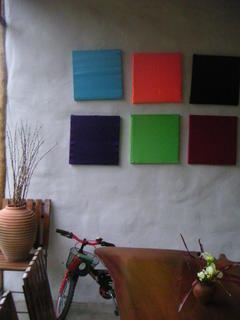
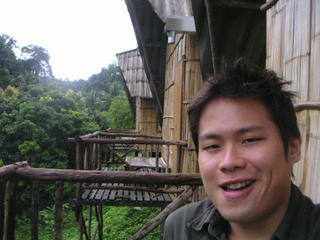
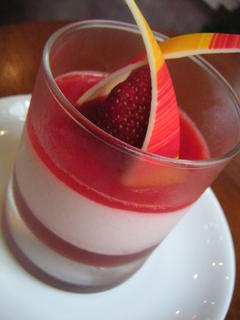
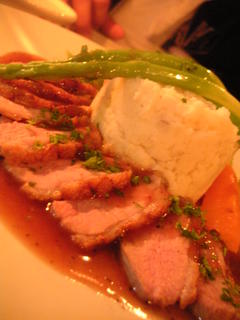
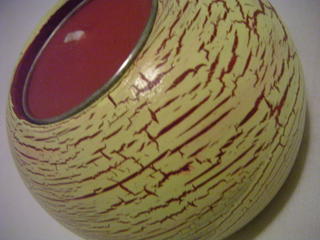
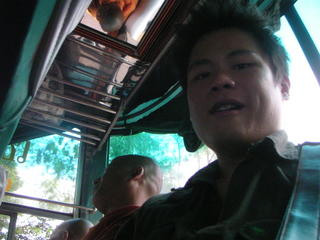
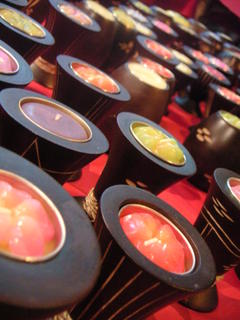
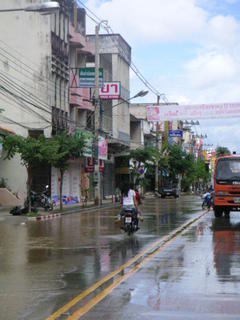

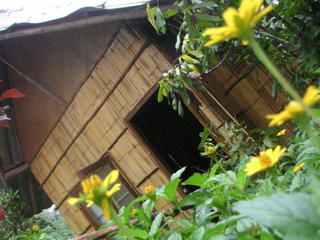
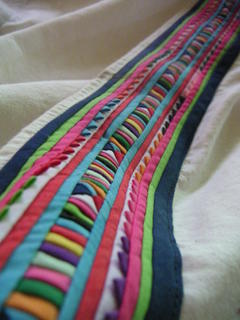
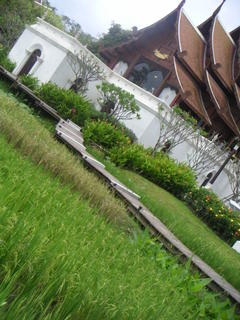

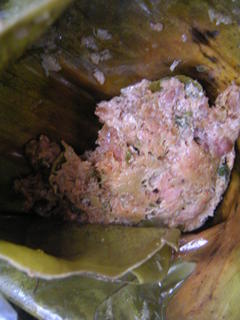 More Images from Chiang Mai/Chiang Dao
More Images from Chiang Mai/Chiang DaoChiang Dao
Did I mention I hitched a ride for the very first time?
On the road between Chiang Dao and Tha Ton/Fang, we alighted from our bus abruptly. We had long overshot our destination, Chiang Dao, by a good 40 minutes. We had planned to stay for a night at the tranquil Chiang Dao Nest, which is just under 1.5 hours from Chiang Mai. So, desperate to get to the hill station before it turned dark, we had our hands out-stretched, and before I knew it, I had successfully done it. The Thai gentleman was very friendly and sent us right up into the hills. We didn’t even have a chance to thank him.
As it drizzled incessantly, we stepped out of our huts into the café area to have a long dinner. I had a main course of pan-roasted duck breast piqued with honey lime and spices while my friend settled for slow-cooked tenderloin tempered with by garlic and lime. We ended dinner with a passion fruit cheese cake with very little conversation in between. I suppose it was therapeutic listening to the sky raining down into the heart of the forest. With clouds so near we could grab them, it was cooler than usual and convinced me for a wee moment that no amount of good deed would put me closer to heaven than a stay at a hill resort. We retreated to our simple hut of a room, which was cosy and comfortable and had no telly. We both read—I spent an evening pouring over a book on the ethnic minority tribes in the Golden Triangle and so wished I could see them up close.
Next morning, I woke up to a beautiful garden in a secluded forest. I made like Somerset Maugham at my balcony, taking in the quietude. I ate a breakfast of toasts and scrambled eggs, went back to sleep some more before leaving Chiang Dao for Chiang Mai. The rain of the night before—thanks to Vincente—had left many riverside communities submerged in water. The hotel staff had warned me the night before that if the rain got any heavier, I would have to take a boat over the submerged roads to get to my Chiang Mai-bound bus at a dry point. Thankfully, there wasn’t a drop of water on the roads leading to Chiang Mai. Much of Chiang Mai escaped unscathed except for the communities by the
Chiang Mai
Reflections on my second trip to Chiang Mai. I wanna celebrate Thai-ness, Chiang Mai, and the infectious and heart-warming Thai spirit, which seems to reside in every wai. Need I mention that everyone’s very friendly and ready to dispense a smile even to the most inconsequential stranger? It’s not just heart-melting, it’s life-affirming. Yes, granted that scholars like Hochschild (2003)—case in point, the Delta Airlines flight attendants in The Managed Heart—on emotional work have dismissed friendliness and the smile as commercialized emotions, packaged into a commodity and offered, sold. But it’s just so heart-warming and life-affirming to be surrounded by positive people who smile and attempt to make your day.
I often wonder if this friendly spirit seeps into another realm called creativity.
Chiang Mai has long been known as a production centre of handicrafts and furniture. Naysayers argue that wages and production costs—overheads in short—are very low in Thailand, which account for the variety and proliferation of such creative industries on a seemingly grassroots level (whereas in Singapore, costs deter such attempts), but I say that the Thai spirit of artistic production is inimitable and unparalleled.
In fusing the Thai spirit with the indigenous Lanna artisan style, many Bangkokians have been enticed to travel up north to its many villages outside the city proper to procure such great finds. The wonderful stuff you see (polished and prices marked up) in
Mandarin Oriental Dhara Devi, which allows cultural immersion in high style, the $80 million resort is an exercise at capturing the Lanna idyll just before the half-built tunnel freeways threaten to lodge Chiang Mai into the evil scheme of urbano-capitalismo swirl. Travel + Leisure’s Peter Jon Lindberg described the experience at the cascading patio of MO during dinner, “The sun is descending over the paddies, casting shadows across the old wooden rice barn and dripping banyan trees. A straw-hatted villager in an indigo smock guides two water buffalo down a muddy path, trailed by three clucking roosters. As daylight fades, torches spark to life, fireflies flicker, and the farmer and his team turn in for the night, leaving the fields to the scarecrows and crickets”. In creating a space to embody the Lanna spirit, owner Suchet Suwanmongkol and architect Rachen Intawong have built a temple to Lanna architecture.
I dropped by at the Dhara Devi for Oriental Bakery’s legendary cakes and saw how the whole property is akin to a northern Thai village-inspired
No, Chiang Mai is not to be mistaken as the back of beyond. Sure, as